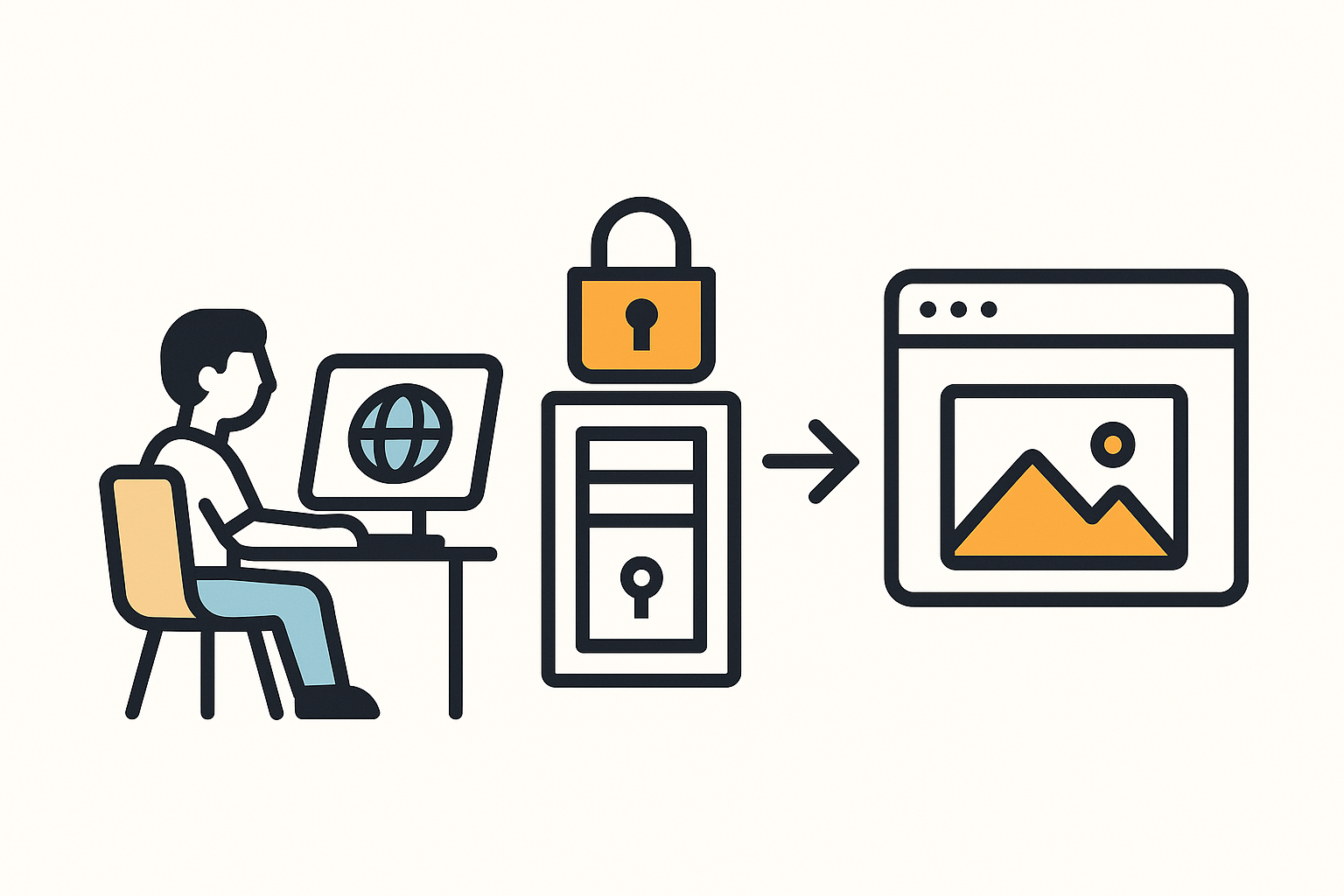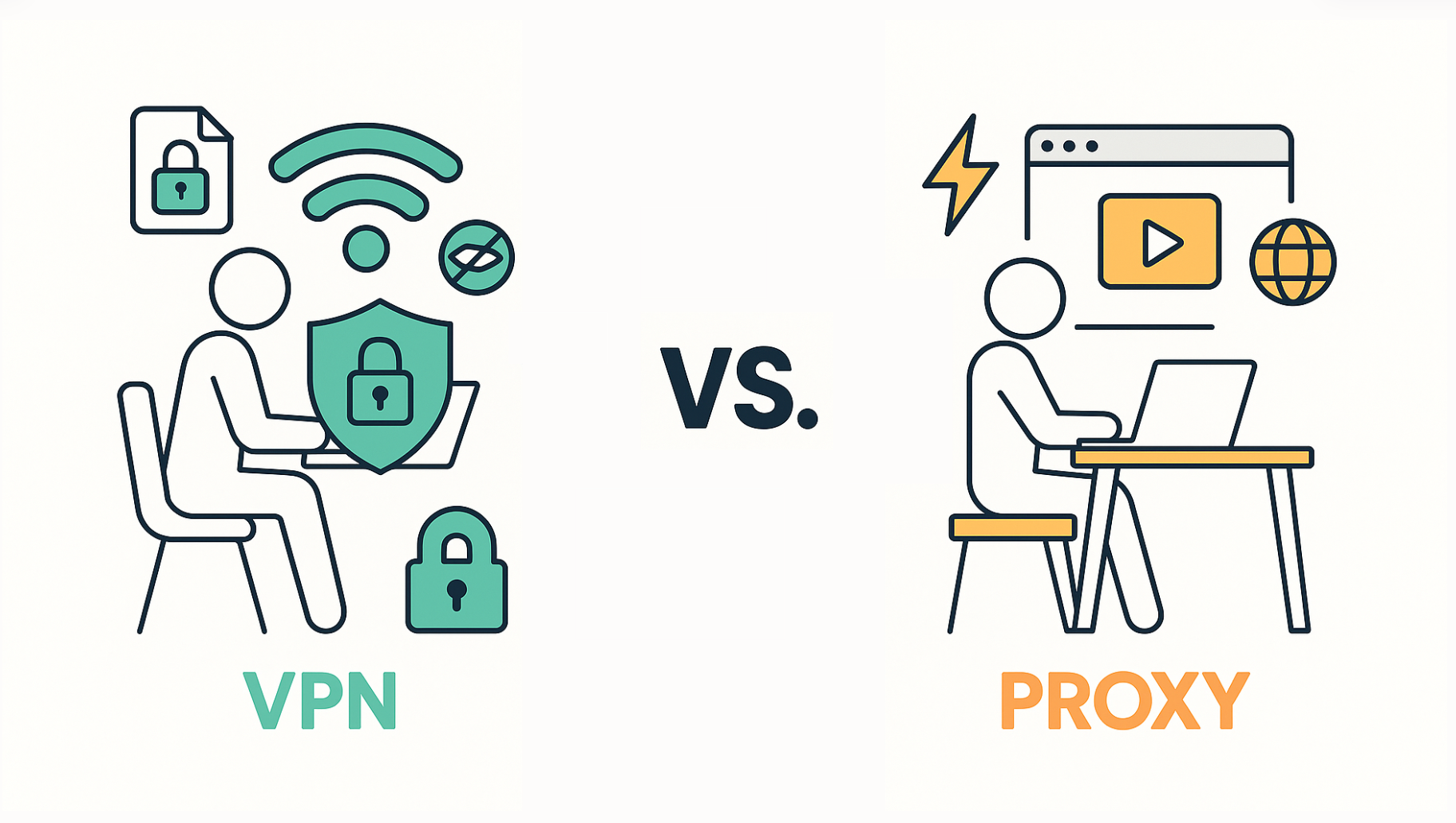If you’ve ever looked into ways to protect your privacy online or access content from a different location, you’ve likely come across two options: proxy vs VPN. Both services route your internet traffic through a remote server to hide your IP address and location. However, a proxy and a VPN are fundamentally different technologies that offer varying levels of security, privacy, and functionality. Understanding these differences is crucial for choosing the right tool for your needs.

What Is a Proxy Server?
Think of a proxy server as a middleman for your internet connection. Instead of connecting directly to websites, you connect through the proxy server first. The proxy then requests the webpage on your behalf and sends it back to you. The website only sees the proxy’s IP address, not yours.
This setup offers basic anonymity, but it’s not foolproof.
- HTTP Proxies work only with web browsers. They’re fast and simple but limited to handling websites and web apps. Perfect for basic browsing tasks.
- SOCKS Proxies handle more types of internet traffic. They work with email programs, file-sharing apps, and games. SOCKS5 proxies are the most versatile option in this category.
- Transparent Proxies don’t hide your IP address at all. Organizations use them mainly to speed up internet connections by caching popular websites.
The biggest advantage of proxies is speed. Since they don’t encrypt your data, they rarely slow down your connection. However, this lack of encryption is also their biggest weakness. Your data travels unprotected, making it vulnerable to anyone monitoring the network.
Learn more about HTTP vs SOCKS Proxy.
What Is a VPN?
A VPN (Virtual Private Network) creates a secure tunnel between your device and the internet. All your online activity passes through this encrypted tunnel before reaching its destination. Even if someone intercepts your data, they’ll only see scrambled, unreadable information.
Here’s what makes VPNs powerful:
- Strong Encryption: A VPN protects your data using military-grade security protocols. Even government agencies would struggle to crack this level of protection.
- Complete IP Masking: A VPN hides your location by replacing your real IP address with the VPN server’s address. Websites think you’re browsing from wherever the VPN server is located.
- Kill Switch Protection: It cuts your internet connection if the VPN fails. This prevents your real IP address from accidentally being exposed.
- Multiple Device Coverage: A VPN lets you protect your phone, laptop, tablet, and other devices with one account.
VPNs sacrifice some speed for comprehensive security. Most users find the trade-off worthwhile, especially when handling sensitive information.
Proxy vs VPN: What Are Key Differences?
Now that you understand what each tool does, let’s compare them side by side. The differences between proxies and VPNs affect everything from your security to your wallet. This comparison will help you see exactly what you get (or don’t get) with each option.
Comparison Table of Proxies vs VPNs
| Feature | Proxy Server | VPN (Virtual Private Network) |
|---|---|---|
| Working Layer | App level – Works per configured app | OS level – Secures all device traffic |
| Data Encryption | None – Data sent in plain text | Strong encryption – Protects all data |
| IP Hiding | Yes – From visited sites only | Yes – From all parties (ISPs, governments) |
| Traffic Coverage | Limited – Only configured apps (e.g., browsers) | Full – All internet traffic and apps |
| Speed Impact | Often faster – No encryption overhead | Slightly slower – Encryption adds overhead |
| Security Level | Low – Basic IP masking | High – Comprehensive protection |
| ISP Monitoring | ISP can still see activity | ISP cannot see – All traffic encrypted |
| Public Wi-Fi | Not secure – No attack protection | Secure – Encryption blocks attacks |
| Device Coverage | Single app only | Multiple devices under one account |
| Kill Switch | Not available | Yes – Blocks traffic if disconnected |
| Setup | Easy – Configure in app/browser | Moderate – Install app, one-click connect |
| Use Cases | Web scraping, geo-unblocking, price checks | Privacy, remote work, streaming access |
| Cost | Usually paid for reliable use | Many free options, paid = faster, reliable |
Data Encryption and Security
This is the most crucial difference between a proxy and a VPN. A VPN encrypts all of your internet traffic, creating a secure, unreadable tunnel between your device and the VPN server. This means that even if someone manages to intercept your data, they won’t be able to decipher it. This level of security is essential for tasks like online banking, shopping, and protecting sensitive information on public Wi-Fi networks.
- VPN: All data is strongly encrypted. Your ISP, government agencies, and hackers cannot see what you are doing online.
- Proxy: Typically offers no encryption. While it hides your IP address, your data remains exposed and readable to anyone monitoring your network. This makes proxies unsuitable for handling sensitive information.
Scope of Protection
A proxy operates on an application level, meaning it only works for the specific app or browser you’ve configured it for. For example, if you set up an HTTP proxy in your web browser, only your browser’s traffic will be routed through the proxy. All other applications on your device—such as your email client, desktop apps, or gaming services—will connect to the internet directly, exposing your real IP address and data.
In contrast, a VPN works at the operating system level. Once you connect to a VPN server, it protects all internet traffic from every application on your device. This provides comprehensive, system-wide protection, ensuring your entire online presence is secure and private.
Speed and Performance
Generally, a proxy server might offer faster speeds because it doesn’t have the overhead of encrypting data. The simple act of routing traffic is less computationally intensive. However, this speed comes at the cost of security.
A VPN, while slightly slower due to the encryption and decryption process, is still very fast, especially with modern protocols like WireGuard. The minor speed reduction is a small price to pay for the significant security and privacy benefits. Free proxies, in particular, are often very slow and unreliable due to overcrowding and limited bandwidth.
Device and App Compatibility
Proxies usually work with one application at a time. You might set up a proxy in your browser but leave everything else unprotected. Some proxy services offer apps that route all traffic, but these are less common and often more expensive.
VPNs shine here. Most VPN providers offer apps for Windows, Mac, iOS, Android, and other platforms. One subscription typically covers 5-10 devices simultaneously. You can protect your laptop, phone, tablet, and smart TV with the same account.
This multi-device protection makes VPNs more cost-effective for families or people with multiple gadgets.
When Should You Actually Use Each One?
The proxy vs VPN decision comes down to what you’re trying to accomplish online. Here’s how to pick the right tool for your situation.

Use Cases of Proxies
Proxies work great for simple geo-unblocking tasks. Want to watch a YouTube video that’s blocked in your country? Need to access a news website that’s restricted at work? A proxy gets the job done quickly without slowing down your connection.
Perfect proxy scenarios:
- Streaming geo-blocked content when speed matters most
- Bypassing basic workplace or school internet filters
- Testing how your website appears from different locations
- Quick access to blocked social media sites
- Casual browsing where privacy isn’t critical
The key word here is “casual.” If you’re not handling sensitive information and just need basic access to blocked content, proxies are simple and effective.
Use Cases of a VPN
VPNs become essential when your online activities involve risk or sensitive information. Here’s when you need the extra protection:
- You use public Wi-Fi regularly. Coffee shops, airports, hotels, and libraries all pose security risks. Hackers love these networks because people let their guard down. A VPN protects you automatically.
- You work remotely or handle business data. Company emails, client information, financial records, and confidential documents need encryption. Many employers actually require VPN use for remote workers.
- You live somewhere with internet restrictions. Some countries block social media, news sites, or communication apps. VPNs help you access information freely while protecting you from government monitoring. For example, you can access Netflix without restrictions using a VPN.
- You’re serious about keeping your browsing private. If you don’t want your internet provider, government, or advertisers tracking your online habits, VPNs are the only reliable solution.
- You have multiple devices. Protecting your laptop, phone, tablet, and smart TV separately with proxies is a hassle. VPNs cover everything with one account.
Making the Right Choice for Your Needs
The proxy vs VPN choice boils down to your priorities. If you occasionally need to access blocked websites and don’t handle sensitive data, a reliable proxy might work. If you value privacy, work with confidential information, or live somewhere with internet restrictions, invest in a quality VPN.
Start by asking yourself these questions: What do you do online? How sensitive is your data? What’s your budget? Do you use public Wi-Fi often? Your answers will point you toward the right solution.
Conclusion
The proxy vs VPN choice depends on your priorities. Proxies work for basic geo-unblocking and casual browsing. VPNs provide comprehensive protection for banking, shopping, and sensitive communications. With data breaches increasing daily, choosing the right privacy tool now matters more than ever. Whether you pick a proxy for speed or a VPN for security, protecting yourself online beats staying vulnerable.
